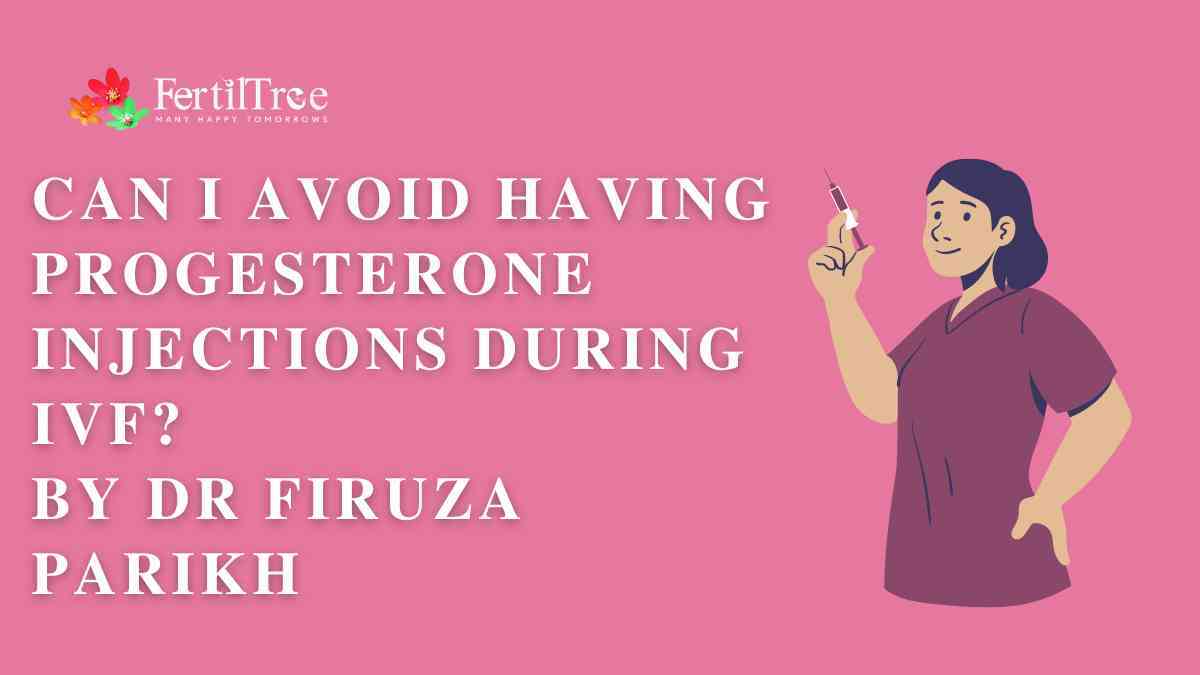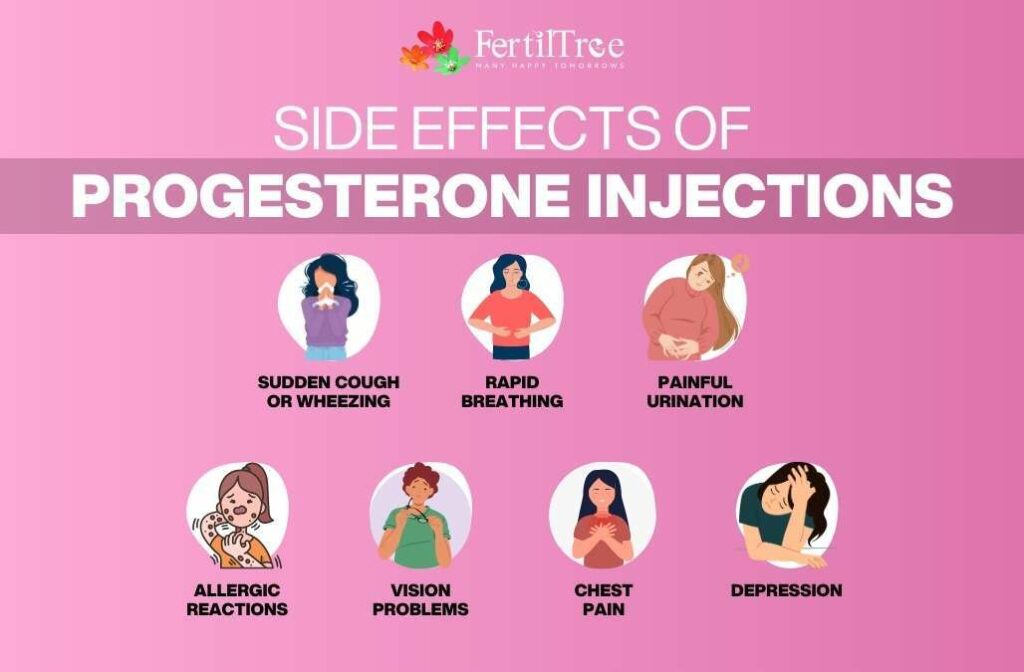
When it comes to in vitro fertilization (IVF), there are often a series of decisions and considerations that need to be made. One such decision has to do with an injection of progesterone, which is prescribed as part of the process of in vitro fertilization (IVF) to increase the odds of becoming pregnant. This blog discusses whether progesterone injections can be avoided during IVF.
Can I Avoid Having Progesterone Injections During IVF? : TOC
What Is Progesterone?
Progesterone is a hormone that is required to support pregnancy. Belonging to a group of steroid hormones, it can be produced naturally during both the menstrual cycle as well as pregnancy. It plays quite a crucial role in supporting the uterus during pregnancy.
When the progesterone levels drop, it can lead to reduced fertility, poor growth of the uterine lining, and an increased risk of miscarriage.
Understanding Progesterone Injections
Progesterone injections help in making the uterus lining thicker so as to prepare it for fertilized egg. It helps in building up the uterus lining so it can receive the fertilized egg. Furthermore, it provides support and nourishment to the developing embryo throughout pregnancy by maintaining the lining of the uterus. There are some common side effects, including redness at the injection site and painful lumps at the injection site. Progesterone injections may also induce allergies of the skin. Most side effects are mild, but if there are any concerns, other options for progesterone medications are available, like vaginal inserts and gel.
A recent study by Devine K et.al, concluded that the live birth rate after vaginal-only progesterone replacement was significantly reduced, due primarily to an increased rate of miscarriage. Vaginal progesterone supplemented with intramuscular progesterone every third day was non-inferior to daily intramuscular progesterone, offering an effective alternative regimen with fewer injections. However, there are some scientific papers that do not show a difference in pregnancy rates between vaginal & injectable progesterone.
Read more: ICSI Procedure in India
Progesterone and FET: Differences
While the body can naturally make some progesterone in a fresh IVF cycle, the case is not the same when it comes to frozen embryo transfer (FET) cycles. As a result, FET cycles rely entirely on externally provided progesterone as a replacement. The preference between progesterone injections and vaginal suppositories in FET cycles varies across clinics, but usually, the majority of clinics opt for progesterone injections in FET protocols.
If you are doing natural cycle ET or modified natural cycle, you can avoid progesterone injections.
In modified natural cycle FET Minimal dose of hormonal injections are given and then a hCG trigger helps ovulation. Because of this natural progesterone is produced. This avoids the use of Inj Progesterone. A small dose of vaginal progesterone will suffice with this method.
Read more: Do’s and Don’ts after your Embryo Transfer
Reasons For Using Progesterone In IVF
Progesterone is commonly recommended for women undergoing fertility treatments like IVF or other assisted reproductive technology procedures. The medications used in these treatments can sometimes disrupt the natural production of progesterone. This is when the need for progesterone supplements arises so as to maintain proper hormone levels.
In certain cases, women may receive progesterone supplements when their ovaries are unable to produce sufficient amounts of this hormone or when their follicles haven’t developed adequately to release progesterone.
How Long Do I Need To Take This?
The ovary is responsible for producing progesterone until the placenta takes over around 8-10 weeks of gestational age. To be on the safer side, most IVF clinics recommend progesterone supplementation for 8-10 weeks after egg retrieval or frozen embryo transfer. However, for the most favourable outcome, patients should discuss this with their doctors.
Read more: IVF Step-by-Step Procedure
Read more: How To Choose The Right Fertility Clinic For You
Should I Check Progesterone Levels While On Progesterone?
Clinics have different practices when it comes to progesterone level monitoring. While some may check, some do not. If the clinic does check, adjustments to progesterone doses may be made based on the measured levels.
What Does the Evidence Say About the Different Progesterone Replacement Methods?
In a recent study conducted by a multi-center fertility clinic, three methods of progesterone administration for preparing the endometrium (lining of the uterus) for frozen embryo transfer (FET) in women undergoing fertility treatment were compared:
-
- Sole use of vaginal progesterone (inserts)
-
- Sole use of intramuscular progesterone (injections)
-
- A combination of vaginal and intramuscular progesterone
The goal was to see if vaginal progesterone is similarly as effective as intramuscular progesterone in achieving live births.
Based on this study, vaginal progesterone alone resulted in significantly lower live birth rates (27%) compared to intramuscular progesterone (44%) or a combination of both (46%). This lower success rate was mainly due to a higher miscarriage rate in the vaginal-only group. However, combining vaginal progesterone with intramuscular injections every third day offered a non-inferior alternative to daily intramuscular injections, achieving similar live birth rates with fewer injections.
This is promising news for patients as it provides doctors with a broader range of safe and effective progesterone replacement options.
Side Effects Of Progesterone Injections

Progesterone injections may lead to several side effects, both common and can even be severe. (Patients must communicate openly with their doctors about any side effects mentioned below to ensure proper guidance and potential adjustments to existing treatment plans).
Some of the most common side effects include headache, pain, or even swelling at the injection site, breast tenderness, acne, nausea, loss of scalp hair, increased body or facial hair, weight gain or loss, dizziness or drowsiness.
Seek medical assistance immediately if you experience any of the following symptoms:
-
- Sudden Cough or Wheezing
-
- Rapid Breathing
-
- Painful Urination
-
- Depression
-
- Unusual Vaginal Bleeding
-
- Allergic Reactions
-
- Lumps in Your Breasts
-
- Severe Headache or Migraine
-
- Slurred Speech
-
- Jaundice
-
- Vision Problems
-
- Chest Pain
-
- Balance Issues/Vertigo
-
- Numbness or Weakness
-
- Pain, Swelling, Redness, Warmth in Legs.
What Happens If You Miss A Progesterone Dose?
Sticking to the prescribed dosage and schedule for your progesterone medication is crucial, as directed by your doctor. Strictly following the recommended treatment plan and monitoring the cycle carefully will enhance the chances of a successful and healthy pregnancy.
For those who are unsure about the optimal timing for taking progesterone for fertility, it’s wise to rely on the guidance of the fertility team. Typically, when using vaginal progesterone, one to two capsules are taken daily for a minimum of two weeks, although specifics may vary based on the prescribed progesterone type and the patient’s fertility plan.
Read more: hCG Levels After IVF Embryo Transfer
Conclusion
To sum it up, progesterone injections are still crucial for most IVF cycles. However, recent research offers some encouraging alternatives. Combining vaginal inserts with injections every third day maintains pregnancy rates but significantly reduces injection count. This offers a good balance between effectiveness and comfort.
While avoiding injections entirely would be ideal, current evidence supports both injections and a combination approach for successful IVF outcomes. The future may hold new progesterone replacement options without needles, but for now, injections remain an important part of most IVF cycles.
FAQs on Can I Avoid Having Progesterone Injections During IVF?
Are progesterone shots necessary for IVF?
Yes, progesterone shots are often necessary during IVF to support pregnancy. They help prepare your uterine lining for embryo implantation and provide crucial support during the early stages of pregnancy. While alternatives exist, progesterone supplementation is a common practice.
What are the alternatives to progesterone shots?
You can find progesterone in gel, tablet, or suppository forms, offering options that can be taken orally or inserted into the vagina. These alternatives eliminate the need for injections.
What is the risk of progesterone injection?
If you’re pregnant and receiving a progesterone injection, the primary concern is the potential risk of developing a blood clot. If you experience sudden pain or swelling in one of your legs or observe a reddened area on your leg, it’s imperative that you contact your doctor immediately.
How can I get progesterone naturally?
You can naturally increase natural progesterone by maintaining a healthy body weight, steering clear of stress and refraining from over-exercising.
Injections of hCG can also boost progesterone levels but getting the ovaries to produce progesterone.
What foods increase progesterone?
Even Though food does not contain progesterone, some can boost your body’s production of progesterone indirectly by enhancing reproductive health.
-
- Nuts
-
- Beans
-
- Whole grains
-
- Pumpkin
-
- Brussels sprouts
-
- Cabbage
-
- Cauliflower
-
- Kale
-
- Spinach
-
- Broccoli
Is pregnancy possible without progesterone?
No, pregnancy without progesterone is not possible.
Read more: What is PRP for Fertility?
Read more: Top Foods To Improve Female Egg Quality
Sources:
Brusie, Chaunie. “Progesterone Injections: Safety and Risks.” Healthline, Healthline Media, 8 Aug. 2016, www.healthline.com/health/pregnancy/progesterone-injections.
Cable, Jessie K. “Physiology, Progesterone.” StatPearls [Internet]., U.S. National Library of Medicine, 1 May 2023, www.ncbi.nlm.nih.gov/books/NBK558960/.
Dante, G, et al. “Use of Progestagens during Early Pregnancy.” Facts, Views & Vision in ObGyn, U.S. National Library of Medicine, 2013, www.ncbi.nlm.nih.gov/pmc/articles/PMC3987350/.
Devine K;Richter KS;Jahandideh S;Widra EA;McKeeby JL; “Intramuscular Progesterone Optimizes Live Birth from Programmed Frozen Embryo Transfer: A Randomized Clinical Trial.” Fertility and Sterility, U.S. National Library of Medicine, pubmed.ncbi.nlm.nih.gov/33992421/. Accessed 9 Feb. 2024.
Marcy. “Progesterone and IVF: So Why Do I Need This?” Fertility Reproductive Medicine Center, 9 Aug. 2019, fertility.wustl.edu/progesterone-and-ivf/.
R;, Nath A;Sitruk-Ware. “Parenteral Administration of Progestins for Hormonal Replacement Therapy.” The European Journal of Contraception & Reproductive Health Care : The Official Journal of the European Society of Contraception, U.S. National Library of Medicine, pubmed.ncbi.nlm.nih.gov/19340703/. Accessed 9 Feb. 2024.
Dr Toni Hazell, MRCGP. “Progestogens: Uses, Administration, and Side-Effects: Doctor.” Patient.Info, 24 Mar. 2023, patient.info/doctor/progestogens.
Nall, Rachel. “Natural Progesterone: Creams, Foods, and More.” Healthline, Healthline Media, 23 Feb. 2023, www.healthline.com/health/natural-progesterone.
Nicole Galan, RN. “How Do You Make Daily Intramuscular Injections of Progesterone Easier?” Verywell Health, Verywell Health, 1 Feb. 2024, www.verywellhealth.com/intramuscular-injections-progesterone-oil-2616512.
“Progesterone Injection (Progesterone Injection): Side Effects, Uses, Dosage, Interactions, Warnings.” RxList, RxList, 15 Sept. 2021, www.rxlist.com/progesterone-injection-drug.htm.c
Book A Consultation

